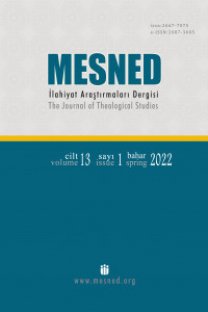NASSLARDA GELECEĞE BAĞLANAN FIKHİ HÜKÜMLER
Esasında, nasların tüm hükümleri, nasların yayınlanmasından hemen sonra mükellefler tarafından yerine getirilmesi gerekmektedir. Bu sorumluluk kıyamete kadar devam eder. Bu, her dilin kökeninin doğası gereği olarak geleceği de kapsadığından kaynaklı bir durumdur. Dolayısıyla nassın geleceğe bağlılığı söz konusu değildir. Bununla birlikte, bu makale gelecekteki belirli durumlara özel hükümler bağlayan nasları ele almaktadır.Bu araştırma geleceğe bağlanan fıkhi hükümleri birkaç açıdan ele almaktadır:1. Bu nasları işletmek ve hükümleriyle amel etmek.2. Bu gelecekteki hükümleri naslardan istinbat etme (türetme) mekanizması.3. Bu nasları olaylara tatbik etme.Bu araştırma üç ilmi kapsamaktadır.1. Fıkıh Usulü: Hükmün geleceğe ta‘liki, önceki hükmü neshetmesi, nassın inşai değil de haberi olduğunda hükme delalet etmesi.2. Fıkıh: Nasslardan istinbatı mümkün olan hükümler, husus-umum, ıtlak-takyid açısından durumu. 3. Sosyoloji: Tarih boyunca hadiseleri ve benzer sosyal olayları ayırt etmek ve bunlardan birine nasssı indirgemek, nassın kapsamına girmesi için bu olayın ayırt edici alametini belirlemeye çalışmak.
Anahtar Kelimeler:
Gelecekteki Olaylar, Gelecekle İlgili Nasslar, Gelecekle İlgili Hüküm, Fıkhi Hüküm, Gelecekle ilgili Fıkıh
Jurisprudential provisions dependent on the future in the Islamic texts
The basic principle is that all the provisions of the texts are obligatory upon the issuance of the texts, and continue until the Day of Judgement. The texts, in this sense, are a fact that is dependent on the future in the origin of the linguistic situation of each case, and there is no dependency in it. However, this research deals with the texts that have related the provisions to specific facts in the future.This research deals with the jurisprudential provisions that are based on the future in the point of view of:1- The attitude towards implementing these texts and the following their provisions.2- The mechanism for deriving these future provisions from the texts.3- Applying these texts to the facts.This research is disputed by three branches of science:1- The origins of jurisprudence: in relating the provision to the future and abrogating an earlier one and the indication of the text on the provision if the text is informative.2. Jurisprudence/Fiqh: in the provisions that can be derived from these texts, and their status in terms of specificity and generality, and generalization and restriction. 3. Sociology: to distinguish similar social incidents and events throughout history and to applying the text on one of them, and to consider the distinctive mark of this incident from the other to be addressed by the text.
Keywords:
future circumstance, texts of the future, future provision, Fiqh provision, Fiqh of the future,
___
- Abdulfettah Hemmam, el-Fıkhu’l-Mustakbali; Te‘sil ve Afak, Mecelletü’l-Va‘Ii’l-İslami, .2012
- Ahmed b. Muhammed b. Hanbel Eş-Şeybânî (ö. 241/855). el-Musned. Thk. Şuayb el- Arnaût ve diğerleri. Beyrut: Müessesetü'r-Risâle, 1420/1999.
- BUHÂRÎ, Muhammed b. İsmâil (ö. 256/870). el-CÂMİU’s-SAHÎH. thk. Mustafa Dîb el- Buğa. 6 cilt. Beyrut: Dâru İbn Kesîr, 1407/1987.
- Ed-Dârimî, Abdullah b. Abdurrahman (ö. 255/869). es-Sünen. thk. Hüseyin Selim Esed ed-Darani. Riyâd: Dâru'l mugnî, 1412/2000.
- El-Kurtubî, Ebû Abdullah Muhammed b. Ahmed (ö. 671/1273), el-Câmi‘ li-Ahkâmi’l- Kur’ân. thk. Ahmed el-Berdûnî-İbrahim Atfîş, Kahire: Daru’l-Kutubi’l-Mısriyye, .1384/1964
- El-Mukrî, Muhammed b. Muhammed (ö. 758/ 1357). El-Kavâid. thk. Ahmed b. Abdullah b. Humeyd. Mekke: Camiatu Ummi’l-Kura, ts.
- En-Nevevî, Yahya b. Şeref (ö. 676/1277). el-Minhac fî şerhi Sahihi Müslim, Beyrut: Dâru İhyâi’t-Turâsi’l-Arabi, 1392.
- Et-Tahâvî, Ahmed b. Muhammed b. Seleme el-Mısrî (ö. 321/933). Şerhu müşkili’l-âsâr. thk. Şuayb el-Arnaût ve diğerleri. Beyrut: Müessesetü'r-Risâle, 1415/1994.
- Ez-Zerkeşî, Bedruddîn Muhammed b. Bahadır (ö. 794/1392). El-Bahrü’l-Muhît fî Usûli'l- Fıkh. 8 cilt. Mısır: Daru’l-Kutubî, 1414/1994.
- Hani b. Abdullah b. Muhammed el-Cübeyr, El-Fıkhu’l-İrtiyadi; Nazarat fi’l-Fıkhi’l- Müsteşrif li’l-Mustakbel (Fıkhu’t-Tavakku), Merkez Nema li’l-Buhus ve’d-Dirasat, Beyrut, 1435.
- İbn Hacer, Ahmed b. Ali el-Askalânî (ö. 852/1449). Fethu’l-Bârî fi Şerhi Sahihi’l-Buhari. Beyrut: Dâru’l- Marife, 1379.
- İbnü’l-Hümâm, Kemâlüddîn Muhammed b. Abdilvâhid es-Sivâsî el-İskenderî (ö. 861/1457). Fethu’l-Kadîr. Beyrut: Dâru’l Fikr, ts.
- Kādî İyâz, İyâz b. Mûsâ b. İyâz el-Yahsubî (ö. 544/1149), İkmâlü’l-Muʿlim bi-fevâʾid (fî şerḥi Ṣaḥîḥ)i Müslim. thk. Yahya İsmail, Mısır: Dâru'l-Vefâ, 1419/1998.
- Karâfî, Şehâbeddin Ahmed b. İdrîs (ö. 684/1285). Enuaru El-Buruk Fi Enuai El-Furuk. 4 cilt. Beyrut: Âlemü'l-kütüb, ts.
- Müslim b. Haccâc (ö. 261/875). el-Câmiu’s-Sahîh. 4 cilt. Beyrut: Daru’l-Cil-Daru’l-Afakı’l- Cedide, ts.
- Muhammed b. Abdullah el-muhaymid, El-Fetva’l-İftiradiyye; Mefhumuha ve Ehemmiyetuha ve Hukmuha, Mu’temeru’l-Fetva ve İstişrafu’l-Mustakbel, Külliyetü’ş-Şeria ve’d- Dirasati’l-İslamiyye, Camiatu’l-Kasim, 1434 h.
- Necmeddin ez-Zenki, Fıkhu’t-Tavakku; Mefhumuhu ve Alakatuhu bi’n-Nazar Fi’l-Meal ve Fıkhı’l-Vakı‘, Mu‘temer fi’khı’l-Vakı‘ ve’t-Tavaku‘, Küveyt, 2013.
- Salkini, Ibrahim Abdullah. Kitâlu'l-Fitne Beyne'l-Müslimîn Bahsun Mukâren. Dâru'nNevâdir: Dımaşk - Beyrut - Kuveyt, 1433/2012.
- ISSN: 2667-7075
- Yayın Aralığı: Yılda 2 Sayı
- Başlangıç: 2010
- Yayıncı: İnönü Üniversitesi
Sayıdaki Diğer Makaleler
“SİYASET”TEN ÖRFİ HUKUKA: SİYASET-İ ŞER’İYYENİN SERÜVENİ
RÛHU’L-ME’ÂNÎ’DE KIRÂATLARIN ANLAMI ZENGİNLEŞTİRMESİ
MİHNE SORGULAMALARI VE BU SORGULAMALARIN KELAMÎ ANALİZLERİ
YAHUDİLİĞİN CENNET TASAVVURU ÜZERİNE BİR DEĞERLENDİRME
TIBB-I NEBEVÎ HADİSLERİNİN BAĞLAYICI OLUP OLMAMASI AÇISINDAN DEĞERLENDİRİLMESİ
ESBÂBÜ VÜRÛDİ’L HADÎS İLE ESBÂBÜ’N-NÜZÛL ARASINDAKİ İLİŞKİ
KUR'ÂN'IN BAZI AŞIRILIKLAR KARŞISINDAKİ TUTUMU
İBN HAZM’A GÖRE ALİ B. EBÎ TALİB VE ONA KARŞI SAVAŞANLARIN DURUMU
KUR’ÂN’IN ÖĞRETİSİ VE MODERN BİLİMİN VERİLERİ IŞIĞINDA “DÜZ DÜNYA TEORİSİ”NİN TARTIŞILMASI
